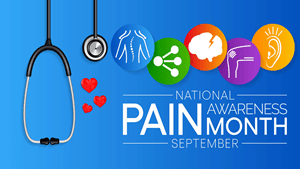
If you have had pain in the same region of your body for three months or more, you are among the millions of individuals suffering from chronic pain.
National Awareness Pain Month is recognized during September, and St. Lawrence Health Pain Management physician Billy Carstens, DO, noted there are many areas of the body that are susceptible to continuous pain. While back pain is widely talked about, other chronic conditions may include the neck and head, hips, knees, lower extremities, hands, and feet.
“Pain can be very debilitating. It can cause a person to be totally disabled, mildly disabled, and anywhere between mildly to severely disabled,” Dr. Carstens said. “Sometimes people have to live with their pain, but there are a variety of options available to ease that pain.”
Treatment Options
Some common causes or conditions for chronic pain are arthritis, migraines, cancer, injuries, disease, fractured bone, brief infection, and/or psychological factors such as stress, anxiety, and depression.
Options for treating such health concerns include pain medications (anticonvulsants for nerve pain, antidepressants, corticosteroids, muscle relaxers, acetaminophen, nonsteroidal anti-inflammatory drugs [NSAIDs]), topical pain medications (usually creams or ointments), opioids/narcotics (for severe, uncontrolled pain), sedatives (for anxiety or insomnia), and medical marijuana.
Other options used to ease pain include a TENS (transcutaneous electrical nerve stimulation) unit, nerve blocks, epidural steroid infections, radiofrequency ablation, and spinal cord stimulation, which is used for cervical or lumbar radiculopathy (pain that starts in the spine and shoots down the extremities).
“Trigger point injections may be very helpful in treating myofascial pain syndrome,” Dr. Carstens said. “Botox injections and occipital nerve blocks may assist many patients in treating migraine headaches. Psychological counseling might also be considered, where patients learn pain coping techniques.”
Receiving treatment from a pain specialist is not necessarily a life-long process. Some patients might only need to be treated for a couple of months, but others may, in fact, require treatment for a number of years if their pain is severe.
Working to Remain Pain-Free
According to Dr. Carstens, there are a number of important details about pain management that need to be kept in mind.
“Pain management requires teamwork where the patient and provider work together. The patient must try reducing their stress as much as possible by using a variety of techniques, including meditation, deep breathing, and possibly eliminating things in their life that are causing extreme stress,” he said.
Regular exercise in the patient’s daily life routine is very important. Low-intensity options include walking, swimming, water exercises, or riding a stationary biking. Physical therapy and occupational therapy can also be quite helpful.
A healthy diet should also be observed, which means cutting down on sugar intake, reducing overall carbohydrates, and eating plenty of fruits and vegetables on a daily basis.
“Getting good quality sleep is also very important in the process of controlling pain, since poor quality sleep tends to worsen the pain a person is experiencing,” Dr. Carstens said.
“Overall, combining all of the above, with the help of a pain management specialist, can be extremely helpful in controlling a person’s chronic pain,” he continued.